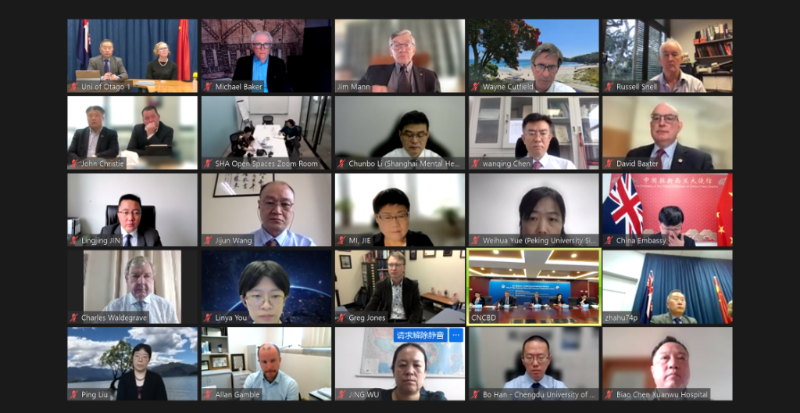New evidence that people who have had COVID-19 have a 40% greater risk of developing diabetes compared with those who have not had COVID-19 was presented among dozens of potential research areas and confirmed collaborations discussed at a “strikingly” successful e-forum between top flight New Zealand and Chinese researchers.
At the third China-New Zealand Non-Communicable Diseases (NCD) Research Cooperation Forum on 5-6 July, some 70 online attendees discussed mutual areas of research, such as diabetes, child obesity, cardiovascular illness, cancer, brain science and modernising traditional medicine.
Discussion about the diabetes epidemic in NZ (260-270,000 people) and China (140 million) included the new evidence of how COVID-19 raised the risk of developing diabetes.
The COVID-19 era and its impact on people with NCDs was also the topic of both keynote speakers, University of Otago Public Health Professor Michael Baker, and Professor Yu Wang – the former director general of the Chinese Center for Disease Control and Prevention and current president of the Chinese Foundation for Hepatitis Prevention and Control.
Between them, they made clear that if you have an NCD such as diabetes, cancer, heart disease, obesity or high blood pressure, you have a higher risk of getting a severe COVID-19 infection. With each COVID-19 reinfection the risk increases. As older people are more likely to have an NCD, they are more at risk of COVID-19-related death, especially when the infection coincides with an overloaded public health system.
The forum’s main objective was to identify possible future research collaborations in priority areas and report on existing collaborative research, says University of Otago Professor Jim Mann, the Director of the New Zealand-China NCD Research Collaboration Centre (NCD CRCC).
Professor Mann says, “The pause caused by COVID-19 has only made the appetite for working internationally with like-minded colleagues all the stronger. Strikingly so.”
Potential for collaboration around promotion of healthy lifestyle and diet to prevent NCDs such as diabetes and heart disease also caused excitement. For example, University of Otago Medical School’s Dr Andrew Reynolds’s presentation included salt reduction and the lifestyle management of NCDs. This immediately led to the Chinese Centre for Disease Control and Prevention’s to call for the wheels to be set in motion for sharing salt reduction strategies.
Dr Reynolds says, “Salt intake is the biggest predictor of high blood pressure, which is then the biggest predictor for stroke. Here in New Zealand we eat around twice as much salt as recommended, mainly from packaged foods, while in China they consume three times as much as recommended, so it is a very relevant topic to both countries. This forum provided an initial “hello” moment between like-minded researchers.”
Border openings have reignited an agreement made just prior to the COVID-19 pandemic for a cohort of international students from Chengdu University of Traditional Medicine, China, to Otago. These students will be able to complete one and a half years of study in their own country, and then years two and three in Otago’s School of Pharmacy Bachelor of Pharmaceutical Science degree programme
Dunedin City Council’s Enterprise Dunedin Director, John Christie says, “The 2023 cohort will be among the first international students to return to Otago, with associated economic benefits for the city as the students spend time here.”

